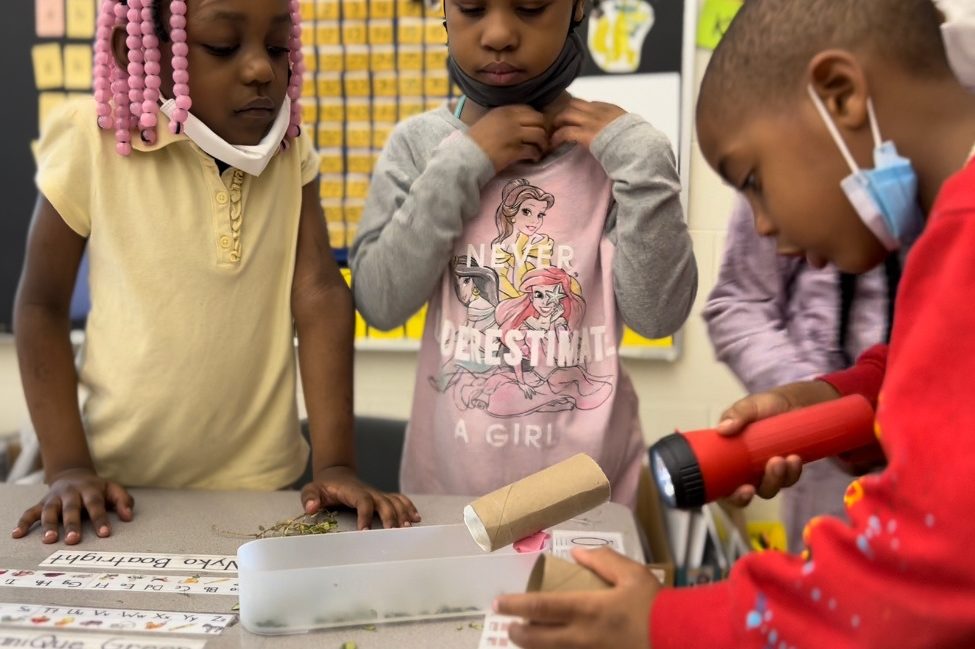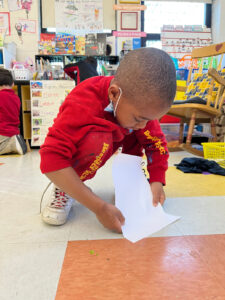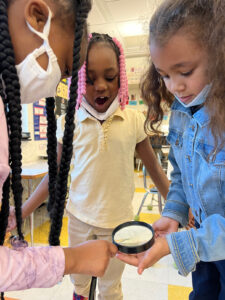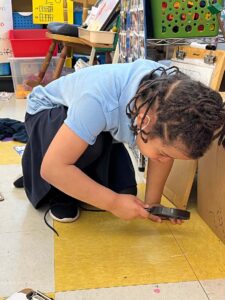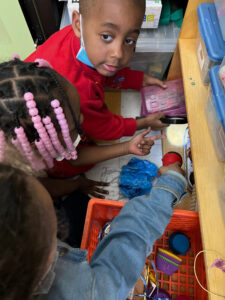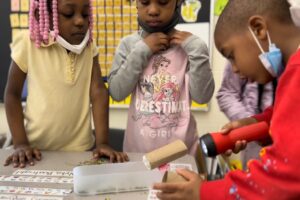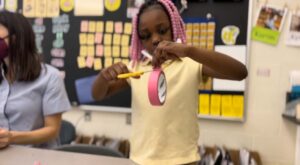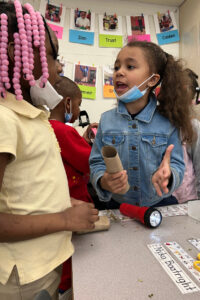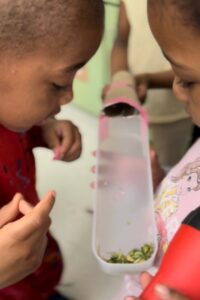This year, Hatch Partners in Play (often known simply as Hatch) has completely shifted the format and focus of our work. We know play is a right and need of all children, but research shows that Black children are most likely to be denied access to free, uninterrupted play and exploratory learning experiences (Souto-Manning, 2017). To make play more equitable and accessible to learners of color, we’ve centered our efforts on Pittsburgh Public Schools (PPS) Faison Elementary, which serves predominantly Black, 95% low-income families.
Our vision is that all children will have access to play experiences that honor their unique strengths, perspectives, ideas, and interests. Funded in part by a Remake Learning Moonshot grant, we’ve collaborated with educators at Faison to launch “Playlabs” in kindergarten and first-grade classrooms, as a way to prioritize play and its many learning benefits throughout the school day.
These protected, extended periods of child-led free play–outside of recess, specials, or academic blocks–focus on exploration of materials, collaboration, social-emotional learning (SEL), storytelling, and problem-solving. Playlabs are designed with intentionality, offering children high-quality, open-ended materials and inviting them to explore freely, collaborate with others, or work independently, guiding their own experience.
Following each Playlab, learners document and reflect on their experiences in Play Journals. These provide an equitable way for learners to practice literacy skills and metacognition around their experiences and choices in a judgment-free process of expressive writing and drawing.
In addition, our team carefully documents play experiences using photos and videos. We translate these assets into Play Stories, which act as a form of holistic, individualized assessment. Stories help us map learners’ play experiences to PA Core Standards and SEL skills, as well as generate strengths-based images of each child’s learning trajectory.
Read a sample Play Story below.
The structure of Playlab and its modes of documentation and assessment honor diverse intelligences, highlighting and celebrating intra- and interpersonal skills, as well as linguistic, mathematical, and kinesthetic development. We seek to cultivate learning experiences with Pittsburgh Public Schools’ educators that nurture the whole child, invite joy, encourage curiosity, and foster creativity.
We believe that every child has the right to be seen and understood by their peers and teachers and know that play is a powerful means of honoring a child’s development. Open-ended classroom play is an equitable, equalizing, and accessible learning strategy. It requires no advanced study or experiences from the children and allows them to bring their interests, passions, and competencies into their academic practice. We embrace the idea that “When kids are compelled by what they are learning and eager to know more, they develop… strategic spirit.” (Goudvis, Harvey, Buhrow 2019). In this way, play allows children to be the drivers of their own learning, creating opportunities for the deepest of inquiries and knowledge construction.
Play Story: From Inquiry to Innovation
A tiny ant sparked enormous curiosity today during Playlab in Mrs. Capozzoli’s class! It made us wonder: What is the recipe to support deep, meaningful inquiry experiences in the classroom? How is a culture of wonder and curiosity nurtured?
The children could have easily been redirected toward a different choice if the adults in the room did not see value in the experience of ant exploration. Instead, Mrs. Capozzoli found a magnifying glass and we grabbed some clipboards and pens to draw.
The children had time, space, and agency in the classroom to play. We offered tools and supplies as support, but their experiences stretched far beyond interacting with play materials in conventional ways.
They reasoned, predicted, and investigated a corner of the room where they anticipated they might find more ants. They decided to address the challenge of collecting more for exploration. Someone threw out the idea of a trap.
The children had access to basic prototyping supplies in the classroom, like tubes and tape. They landed on using some pieces of bush they had collected during recess as bait.
Working together on the trap offered an opportunity for problem-solving, testing, negotiating, and sharing skills. The children advocated for their ideas but supported each other, too. There were several iterations, and several back-and-forths to the corner, to test out the trap.
They celebrated every success with joy and clapping. Ultimately, the design team was successful and marveled at what they created!
Wondering & Questioning
Investigating & Addressing
Prototyping & Problem Solving
Investigating & Addressing
